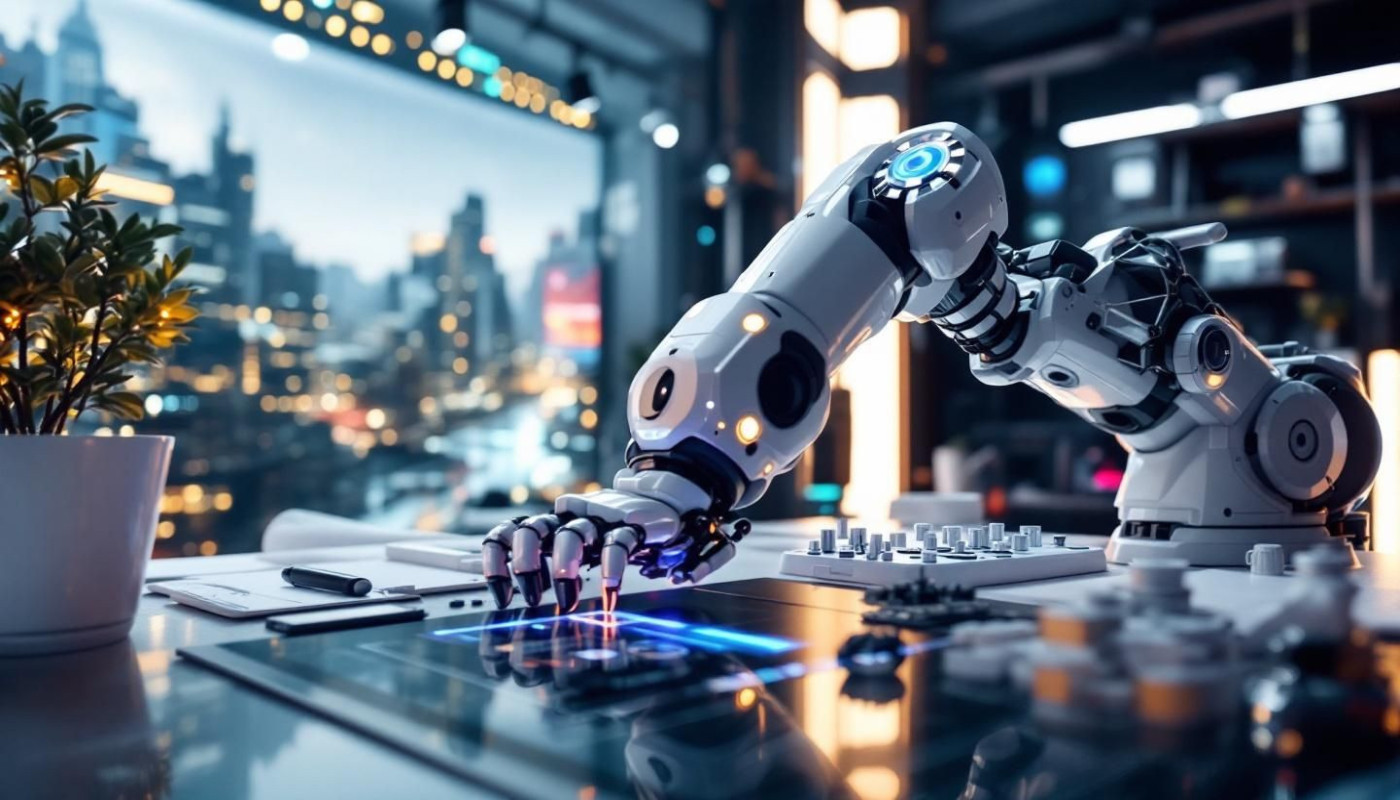Table of contents
Artificial Intelligence (AI), once a topic of science fiction, is now rapidly transforming the world we live in today. It has infiltrated multiple sectors and industries, from healthcare to transportation, significantly altering how we solve problems and make decisions. AI technologies are redefining our future by presenting new possibilities for growth and advancement. As we delve deeper into this exciting field, we'll address key areas where AI is making its mark—like reshaping businesses or impacting personal lives—and consider some ethical implications that arise with these advancements. This exploration seeks to underscore the importance of understanding AI's potential as well as its limitations.
Understanding Artificial Intelligence
Artificial intelligence, commonly known as "AI," is a cutting-edge technological concept that is driving significant advancements in various sectors today. The primary element of AI is its ability to mimic human intelligence, enabling machines to learn, reason, and solve problems. A key component of AI is "machine learning," which allows computers to automatically learn and improve from experience without being explicitly programmed.
Furthermore, a crucial feature of AI is the concept of "neural networks." These are intricate systems designed to replicate the function of the human brain, facilitating the process of decision making in AI. Understanding these core components - artificial intelligence, machine learning, and neural networks - is vital in today's world, as they form the backbone of numerous technological innovations and solutions.
Another significant aspect of AI is "data analysis." AI systems utilize machine learning algorithms to sift through large amounts of data, identify patterns, and make predictions, thus empowering businesses to make data-driven decisions. This integration of AI in data analysis has opened up new avenues for growth and innovation.
Moreover, understanding the myriad "AI applications" across various fields from healthcare to finance, from education to entertainment, is integral to grasping the comprehensive potential of this technology. With continual advancements, AI is not just reshaping the future; it is redefining the present, making its comprehension today, more than ever, indispensable.
The Impact of Artificial Intelligence on Business Sector
Artificial intelligence (AI) has significantly reshaped the landscape of the business sector, leading to a monumental shift in operations that has resulted in enhanced efficiency and productivity. By leveraging the power of AI, businesses are realizing substantial improvements in various facets of their operations. A notable example is the realm of "automation," where AI-powered machines can perform repetitive tasks with vast speed and accuracy, freeing up human resources for more complex duties. With the introduction of AI in business, companies have been able to reduce errors, increase speed, and achieve higher levels of consistency.
Moreover, AI has extended its influence to the domain of “big data,” facilitating superior data analysis capabilities and informative insights. With the aid of AI algorithms, businesses can sift through massive data sets, identify patterns, and make informed decisions. This not only improves the decision-making process but also fosters predictive and proactive strategies that can be a game-changer in today's competitive business environment.
In brief, AI's impact on the business sector is undeniable, driving "business transformation" on a significant scale. From streamlining operations to providing deep analytical insights, AI is indeed redefining the future of businesses today. The ongoing advancements in AI technology promise even more potential for innovation, making it an indispensable tool in the modern business arena.
The Personal Life Aspect:
Artificial intelligence (AI) is no longer just a concept reserved for the silver screen or complex tech labs; it has seamlessly integrated into our everyday lives. A key manifestation of this cutting-edge technology is in the smart homes we inhabit. With AI-powered virtual assistants, we can control appliances, manage energy consumption, and ensure home security, thus simplifying daily chores by a significant measure.
In the same vein, AI brings about a revolution in entertainment, particularly on streaming platforms. Personalized experiences have become the norm, with AI algorithms analyzing user behavior to provide tailored content recommendations. This feature has radically transformed our content consumption patterns, making our leisure time more enjoyable and efficient.
Real-time tracking, another milestone in AI technology, offers detailed, instantaneous information. This technology plays a paramount role in various sectors such as logistics, healthcare, and digital marketing, enhancing efficiency and transparency.
While the growing presence of AI in our lives might seem intimidating to some, the myriad of possibilities it offers to make our life easier and more efficient is undeniably exciting. As we continue to explore and harness its potential, our interaction with the world continues to transform in ways previously unimaginable.
Ethical Implications Linked with Artificial Intelligence Adoption:
Artificial intelligence (AI) has undoubtedly revolutionized the way we live and work, offering numerous advantages and efficiencies. Nonetheless, with the rapid adoption of AI systems come several contentious issues that cannot be overlooked. One significant aspect is 'privacy concerns.' AI's ability to gather, analyze, and use vast amounts of data tends to infringe upon people's privacy, a situation that necessitates stricter regulations and mechanisms to safeguard user information.
Besides, there's the issue of 'job displacement.' As AI continues to automate processes, it's anticipated that many traditional roles might become obsolete, leading to job losses. In response to this, retraining and reskilling initiatives are seen as potential solutions to equip the workforce for the changing market demands.
Other notable 'ethical implications' include the potential 'bias' of AI systems. Since these machines learn from data, there's a risk of them perpetuating existing biases, which could lead to unfair outcomes. Hence, it's necessary to design and train these systems in a way that minimizes bias and promotes fairness.
Furthermore, there's the question of 'accountability.' In case of a system failure or unintended consequences, who should be held accountable? This question remains unanswered and is a key area of focus for policy makers and AI developers. In the end, while AI holds the potential to redefine the future, it is important to address these ethical implications to harness its advantages responsibly and effectively.
Similar articles



